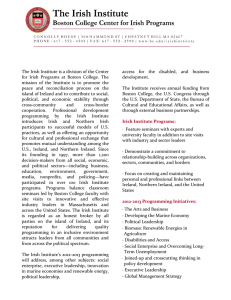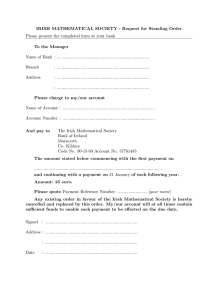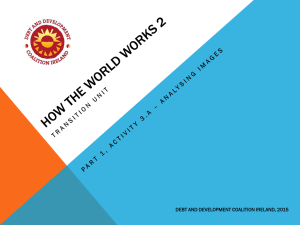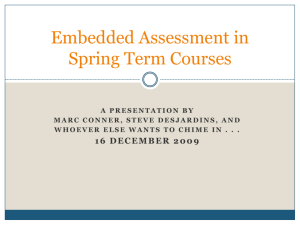irish studies center for irish programs Commemorating the Sesquicentennial
advertisement
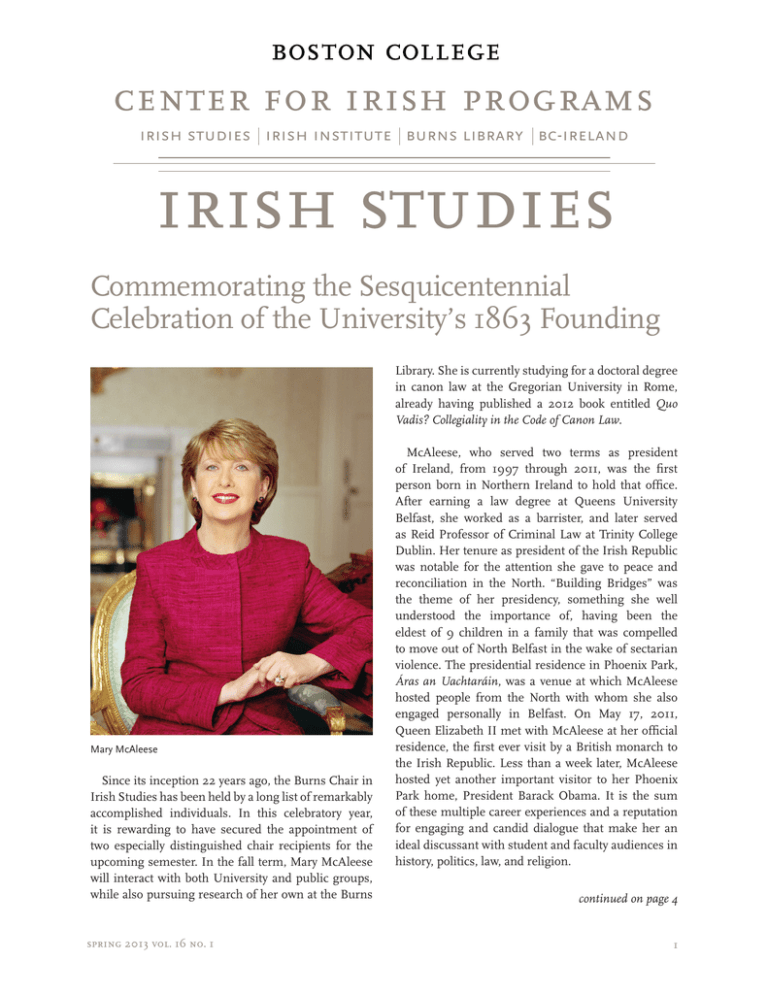
center for irish programs irish studies irish institute burns library bc-ireland irish studies Commemorating the Sesquicentennial Celebration of the University’s 1863 Founding Library. She is currently studying for a doctoral degree in canon law at the Gregorian University in Rome, already having published a 2012 book entitled Quo Vadis? Collegiality in the Code of Canon Law. Mary McAleese Since its inception 22 years ago, the Burns Chair in Irish Studies has been held by a long list of remarkably accomplished individuals. In this celebratory year, it is rewarding to have secured the appointment of two especially distinguished chair recipients for the upcoming semester. In the fall term, Mary McAleese will interact with both University and public groups, while also pursuing research of her own at the Burns spring 2013 vol. 16 no. 1 McAleese, who served two terms as president of Ireland, from 1997 through 2011, was the first person born in Northern Ireland to hold that office. After earning a law degree at Queens University Belfast, she worked as a barrister, and later served as Reid Professor of Criminal Law at Trinity College Dublin. Her tenure as president of the Irish Republic was notable for the attention she gave to peace and reconciliation in the North. “Building Bridges” was the theme of her presidency, something she well understood the importance of, having been the eldest of 9 children in a family that was compelled to move out of North Belfast in the wake of sectarian violence. The presidential residence in Phoenix Park, Áras an Uachtaráin, was a venue at which McAleese hosted people from the North with whom she also engaged personally in Belfast. On May 17, 2011, Queen Elizabeth II met with McAleese at her official residence, the first ever visit by a British monarch to the Irish Republic. Less than a week later, McAleese hosted yet another important visitor to her Phoenix Park home, President Barack Obama. It is the sum of these multiple career experiences and a reputation for engaging and candid dialogue that make her an ideal discussant with student and faculty audiences in history, politics, law, and religion. continued on page 4 1 Burns Library Irish Collections Celebration of the University’s sesquicentennial anniversary was made all the more memorable for the Burns Library with the receipt of a signature gift of four sculptures that are uniquely distinct from anything on the planet. The artist, renowned Irish sculptor Rowan Gillespie, set out to painstakingly create busts of the four Irish literary laureates, William Butler Yeats, George Bernard Shaw, Samuel Beckett, and Seamus Heaney. Dozens of photographs were employed in his effort to capture likenesses that depict each of the authors at the age of his Laureate Prize. The Laureates are mounted on pedestals inscribed with the authors’ works and stand six feet high in order that they may “communicate” eye-to-eye with the viewer. The pedestals are positioned on each side of the podium in the library’s Thompson Room, where the Burns Chair holder has traditionally delivered a bi-annual lecture. The sculptures are the gift of the Brian Burns family, which previously endowed the Burns Chair and has made significant contributions to the library’s special collections. Other works by Gillespie adorn the Custom House Quay (Famine) and the Belfast waterfront (Titanica). Additionally, the completion this year of an ongoing effort to curate the Emmet Larkin papers is an achievement that further enhances the already rich private collections at the Burns. Those specializing in any study of the Roman Catholic Church in 19th century Ireland will certainly find this collection a treasure trove. It contains Larkin’s extensive correspondence with Irish episcopal sees, monasteries and convents, religious orders, Vatican officials, academics, and government leaders. Also included are drafts of manuscripts and unpublished ecclesiastical documents and his extensive correspondence with American and international scholars. A detailed summary of the holdings will be accessible once the project is completed. 2 The Musical Roots of Séamus Connolly, Sullivan Artist-in-Residence An Exhibit at the John J. Burns Library, Boston College, from January 25-May 23, 2013 This spring, an exhibit at the Burns Library highlights influences and milestones in the music career of Sullivan Artist-in-Residence Séamus Connolly. A world-renowned Irish traditional musician, performer, and teacher from Killaloe, Ireland, Séamus Connolly won 10 All-Ireland solo fiddle championships before immigrating to the United States in 1976. As Sullivan Artist-in-Residence in the Center for Irish Programs, Connolly teaches fiddle, directs Irish music and dance instruction on campus, and curates the Gaelic Roots Music, Song, Dance, Concert, and Lecture Series. The materials on view were primarily selected from the Séamus Connolly Papers at the Burns Library, with additional items from the Burns Library’s Irish collections. For more information about this exhibit or the Burns Library’s Irish Music Archives, please contact elizabeth.sweeney@bc.edu or visit www.bc.edu/burns GAELIC ROOTS SPRING 2013 CONCERT SERIES Connolly, in addition to his organizational role in the Gaelic Roots series, is continuing his efforts to support and enhance BC’s Irish Music Archive. He recently donated 100 VHS recordings of performances, broadcasts, and other events that include many legendary Irish and Irish-American musicians. Remaining performances include: Thursday, March 14 Kathleen Conneely Kicking off Gaelic Roots’ spring schedule was Brendan Bulger, a former student of BC’s Sullivan Artist-in-Residence Seamus Connolly, who is currently teaching fiddle at BC. Other concerts taking place this semester feature the trio of Kathleen Conneely, Dan Gurney, and Eamon O’Leary, each an outstanding performer in his or her own right (Feb. 12); fiddler Matt Cranitch and accordionist Jackie Daly, considered among the finest interpreters of the rich tradition of instrumental music from Sliabh Luachra in the west of Ireland (March 14); and husband-wife guitar-fiddle duo Keith Murphy and Becky Tracy, whose repertoire covers tunes and songs from Newfoundland, Quebec, Ireland, and New England (April 2). Closing out the 2012-13 Gaelic Roots slate will be an Irish dance and céilí, with music by Connolly, Boston College students, and other area musicians. (Information on Gaelic Roots events is available at www.bc.edu/gaelicroots) Irish Music on Fiddle and Accordion: Concert with Matt Cranitch and Jackie Daly Walsh Hall Function Room 6:30 to 8:30 p.m. Chestnut Hill Campus, BC recordings including their 2010 release, The Living Stream. Tuesday, April 2 Music of Newfoundland, Quebec, Ireland, and New England: Concert of Fiddle Tunes and Songs, by Becky Tracy and Keith Murphy Walsh Hall Function Room 6:30 to 8:30 p.m. Chestnut Hill Campus, BC Becky Tracy began playing fiddle for contra dancing in Maine, bending her early classical training to the demands of dance music. Later, she studied Irish fiddling styles with Brendan Mulvihill and Eugene O’Donnell, and French Canadian fiddling with Lisa Ornstein. A native of Newfoundland, Keith Murphy’s traditional song repertoire is based in Eastern Canada and Quebec as well as his current home, Vermont. He is an accomplished composer and arranger in the realm of traditional music and has also composed for theater and film. Wednesday, April 17 Matt Cranitch and Jackie Daly Cranitch and Daly are among the foremost interpreters of the rich tradition of instrumental music from Sliabh Luachra, the unique cultural area on the borders of northwest Cork and east Kerry that is marked by a special repertoire of tunes as well as a distinctive style of playing. Both musicians were part of the faculty at Gaelic Roots when it was a summer festival, and have appeared on numerous Traditional Irish Dance and Céilí: Music by Sullivan Artist-inResidence Séamus Connolly, with Boston College students and friends. Gasson Hall Irish Room 6:30 to 8:30 p.m. Chestnut Hill Campus, BC Participatory dances will be taught, and no prior experience is necessary. The evening will include music and dance performances by Boston College students. all of the above concerts are free and open to the public. For more on the Gaelic Roots Series, visit www.bc.edu/gaelicroots or telephone 617-552-6396. Co-sponsored by the Center for Irish Programs and the Irish Music Center of the John J. Burns Library 3 Sesquicentennial Celebration of the University’s 1863 Founding continued from page 1 Professor Terence Brown of Trinity College Dublin will hold the Burns Chair in the spring semester of the coming year. He will teach a seminar entitled “The Poet and Poetry: Yeats, MacNeice, and Heaney,” while also pursuing further research of his own at the Burns Library. The seminar, through selected critical writings of W.B. Yeats, Louis MacNeice, and Seamus Heaney, will consider how their views of the Irish poets’ roles developed and changed during the course of their careers. It will also study, through readings of selected individual poems, how different aesthetics affected their own poetry in marked ways. The study will assess how these poets responded to political and social crises, to violence, and to the challenge which modernity presented to poetry itself. The iconic status of Yeats for both MacNeice and Heaney will also be addressed as the course examines the work of Ireland’s best-known poets as theorists and practitioners. Terence Brown taught on the Trinity College faculty from 1971 until he retired as professor and Trinity Fellow Emeritus in 2007. He was elected a member of the Royal Irish Academy in 1992 and the Academia Europeia in 1994. He has lectured or served as a visiting professor in Britain, France, Australia, and the United States. Brown was Parnell Visiting Research Fellow at Magdalene College, Cambridge University, in 2007-08, and received the Golden Apple Award from the Yeats Society of New York in 2009. He presently serves as Chair of the GeneSIS Project board. Terence Brown has authored or edited a significant number of books, chapters in books, and scholarly articles including Louis MacNeice: Skeptical Vision (Dublin and N.Y., 1975); The Life of W.B. Yeats: A Critical Biography (Oxford and Dublin, 1999); and his magisterial study entitled Ireland: A Social and Cultural History, 19222002 (London, 2004), a work that has endured as a classic in successive editions. His current book in progress is a social and cultural history of the Irish Times. He is very deservedly recognized as one of the pre-eminent academics in the field of Irish Studies. 4 Renowned Irish sculptor Rowan Gillespie, shown with his series of sculptures: The Four Irish Literary Nobel Laureates: Yeats, Shaw, Beckett, and Heaney. —Photo by R. Kohn Coming Exhibit Vera Kreilkamp of the Irish Studies program and Diana Larsen of the McMullen Museum will co-curate a September-December 2015 exhibition of the Irish Arts and Crafts Movement at Boston College’s McMullen Museum. In fall 2012, the cocurators explored public and private collections in Dublin, Belfast, and Cork as well as in Loughrea, County Galway. Artifacts from Cork’s Honan Chapel (1916), Ireland’s major Irish Arts and Crafts edifice, will figure prominently in this first American exploration of a Revivalist visual arts movement that arose in a period of accelerating Irish cultural and political nationalism. The Boston College exhibition will subsequently travel to Cork City, Ireland. Boston College-Ireland A Decade of Commemoration 1913 was a tumultuous year in Irish history. Debates over Home Rule for Ireland dominated the papers on a daily basis, guns were brought into the country by unionists appalled at the spectre of Dublin rule, the political instability in the Balkans was becoming ever more evident, the suffragettes clamored for the vote, and industrial unrest would lead to the Dublin lockout of late summer that year. Despite all these major happenings, normal life continued. People shopped, worked at their jobs, raised their families, attended sporting and social events, and followed the latest fashions and trends. Such a depth of history was not unique to 1913; indeed the whole decade up to the ending of the civil war in 1923, would see Ireland transformed and caught up in a maelstrom of domestic and international events. This period, from the passage of home rule to the ending of the civil war, will be commemorated and explored in Ireland as part of a decade of commemoration. Boston College-Ireland is currently working on an extensive plan to produce a decadelong public history program. Provisionally titled Century Ireland, the project will lead the public, in Ireland and overseas, through the events of a century ago and will be delivered via the Internet and social media. The Century Ireland Web site will be renewed on a fortnightly basis, beginning in late spring of 2013, and will feature a digest of the news from a century ago including the big political stories as well as the minutiae of everyday life. The research team at Boston College-Ireland will be headed by Professor Mike Cronin and assisted by Dr. Paul Rouse of University College Dublin and Mark Duncan of InQuest. Our team has a long track record of excellence in the public history arena and previously ran the Gaelic Athletic Association’s Oral History Project. More news on this exciting initiative will follow in the weeks after Easter of this year and further information will be included on the Boston College Web site. “150 on the Road” On Saturday, May 4, Boston College-Ireland will host our University president, William P. Leahy, S.J., as he attends one of the many events scheduled during the year to celebrate the sesquicentennial of the founding of Boston College. The day will be centered on BC’s sesquicentennial initiative, “150 on the Road.” The half-day gathering will offer an opportunity to connect with alumni, parents, families, and friends in Ireland (and from across Europe) for fellowship, networking, and volunteering. Together, as “men and women for others,” the aim is to continue to light the world with a “Helping Hands” service project to package 150,000 meals for hungry families. The event will be held at the Conrad Hotel in Dublin, and will close with a lunch attended by Father Leahy. To find out more, and to register for the event, go to: http://web.bc.edu/uadvance/websites/150ontheroad/ St. Patrick The annual focus on Ireland’s patron saint will be observed in March of this year as usual. To celebrate the day and attempt to move beyond some of the stereotypes associated with the man and his people, RTÉ will screen, on March 14, a special hour-long documentary on St. Patrick and the celebrations of his day. Fronted by Irish comedian and historian Neil Delamere (who won awards for his 2012 documentary series The Only Viking in the Village), the documentary seeks to understand the history of the patron saint and explain why the day has taken on such global significance in celebrating all things Irish. Building on the success of his 2002 book (co-authored with Daryl Adair) The Wearing of the Green: A History of St. Patrick’s Day, BC-Ireland Academic Director Professor Mike Cronin is featured in the documentary. Mike explains who St. Patrick was, why he became Ireland’s patron saint, and the reasons behind the global spread of March 17 celebrations. For those not resident in Ireland, the documentary will be available on the RTÉ Player from March 15, 2013. Irish Studies continued from page 4 Professor Kevin Kenny delivered the fourteenth annual Ernie O’Malley Lecture at New York University in December on the topic “Abraham Lincoln and the American Irish.” 5 The following month, he presented the Second Annual Monsignor John J. Curran Memorial Lecture at King’s College, Wilkes-Barre, Pennsylvania, on the subject “Who Were the Molly Maguires and Why Were They Important in the History of the Anthracite Country?” In February, Kenny lectured on Abraham Lincoln and American immigration at the History Center, University of South Carolina. He has also led seminars on his forthcoming book, Diaspora: A Very Short Introduction (Oxford University Press, 2013), at Glucksman Ireland House (New York University) and at the Boisi Center for Religion and Public Life (Boston College). And he delivered the opening comments at the inaugural event of the “Diasporas Project” of the Jordan Center for the Advanced Study of Russia at New York University. Joyce in Dublin, Summer 2013 Professor Nugent will once more lead Boston College students on a three-week exploration of Joycean Dublin this August. Combining pleasure with rigorous study, Joyce in Dublin will operate out of Boston College-Ireland’s premises on St Stephen’s Green. Students will be guided through the city by Professor Nugent’s award-winning app, JoyceWays (available for download on iTunes). The “textbook” will be his e-book, Digital Dubliners, soon downloadable to the general public (for free) from Apple iBooks. Organized by the Office of International Programs, Joyce in Ireland, is one of the most popular summer courses offered by Boston College. Joyce and the Digital Humanities Conference This year’s spring seminar will explore the impact of technology on Joyce studies today. Speakers have been chosen from the United States and abroad. They include Ireland’s leading liberal intellectual, Fintan O’Toole, and prominent Joycean and former head of news at RTÉ, Ed Mulhall. This hugely popular conference, sponsored by the Institute for Liberal Arts, is open to the public at no charge—though numbers are restricted. The day-long conference will take place in Higgins Hall on Saturday, April 20. Professor Nugent will present his latest work on smartphone technology and the iPad. Contact nugentjf@bc.edu for further information. 6 Irish Institute As Boston College celebrates its 150th anniversary, we, at the Irish Institute, reflect on our 15th anniversary and the achievements and progress those years have seen. Through the Irish Institute, the Belfast Agreement provided an opportunity for Boston College to engage in the Irish peace process by offering professional development programming. Originally, that programming focused on supporting the development of post-conflict political and policing institutions. Since then, the Irish Institute has grown in both the scope of its work and the number of professionals trained. Our alumni now count over 1,200 attendees from a wide range of sectors, including business, education, journalism, politics, non-profits, and civil service. Our programs have examined shared such timely societal challenges as climate change, economic development, emergency preparedness, educational quality, and the rights of marginalized communities. Irish Institute programming helps to create a space for cross-border and cross-community conversations on issues central to Irish and Northern Irish society. Through educational exchange programming, participants are afforded the opportunity to study the makeup of U.S. policies and practices and to establish professional networks across Ireland and the Atlantic. The U.S. Department of State, Bureau of Educational and Cultural Affairs, has helped make this work possible through an annually renewed grant. Cooperating with the Department of State, especially the embassy in Dublin and the consulate in Belfast, the Irish Institute designs and delivers seven professional development programs over the course of each academic year. Programs are typically Marine Economy participants pose with their hosts from the Cooperative Institute for Marine & Atmospheric Studies at the University of Miami During the month of February, the Institute explored “biomass,” a renewable energy for the agriculture sector. The participants, a group of 10 leaders in the Irish and Northern Irish rural economy, examined economic, environmental, scientific, and policy and political factors facilitating the conversion of agricultural waste to sustainable, clean energy. During a fascinating tour, the Arts & Business delegation enjoys the unique “Chair Park” in the famous Milwaukee Art Museum comprised of 10 to 12 policymakers and practitioners, half from Northern Ireland and half from the Republic of Ireland, who visit Boston and one other U.S. city. The first exchange program of this year took place in November and focused on the intersection of the arts and business. Ten participants engaged with their counterparts in Boston, such as the Massachusetts Cultural Council, to discuss the sustainable development of artistic endeavors. Participants then traveled to Milwaukee and Madison. In Wisconsin, cultural festivals like the Milwaukee Irish Fest were studied. The Irish Institute hosted a December program which illuminated U.S. developments in the marine economy sector, including offshore energy, fishing, transport, and recreation. The contrasting cities of Boston and Miami exposed the group to a variety of policies and practices relating to issues unique to each of those areas. The new year saw a group of 12 politicians, senior civil servants, party advisors, and political activists from Ireland and Northern Ireland engaged in a program that explored parliamentary and legislative processes in the United States. The group, including former Minister for Foreign Affairs Dermot Ahern, opposition spokesperson for Finance Michael McGrath TD, and parliamentary party leader for Fine Gael Charlie Flanagan TD, visited political leaders, scholars, lobbyists, and influential congressional members and staff in Boston and Washington, D.C. The highlight of the exchange was the group’s lengthy meeting and luncheon with Maryland Governor Martin O’Malley. Promoting and facilitating access for the physically and mentally impaired to community activities, education, the workplace, and other public and private spaces will be the focus of our April program. The academic year concludes with the Irish Institute welcoming a group of 10 policy makers, politicians, business development professionals, and educators as they examine social enterprise and its role in overcoming long-term unemployment in Boston and Detroit, Michigan. The final program of the grant year will take place in September. That exchange will study the process of joined-up and crosscutting thinking in policy development and implementation in a variety of public institutions. A unique and growing part of the Irish Institute’s work with the U.S. Department of State is what we call “follow-up” programming. Follow-up programming allows participants to continue to develop and enhance relationships formed while in the U.S. through programming in Ireland and Northern Ireland. An important part of that programming includes a symposium series that is run in cooperation with the Department of Foreign Affairs at Iveagh House in Dublin and the Northern Ireland Assembly in Stormont. The symposium series allows selected U.S. experts and exchange program participants to address members of the DFA and Assembly on issues central to our exchange program such as civil rights, peace and reconciliation, and economic and educational development. In addition to its U.S. Government-funded work, the Irish Institute will develop and deliver a range of customized educational exchange programs. In the spring semester, the Institute will continue its longterm relationship with the University of Ulster by hosting the U.U. Executive Leadership MBA program. Also during the summer of 2013, the Institute will welcome MBA students from the Management Center continued on next page 7 center for irish programs Non-Profit Org. U.S. Postage PAID Boston, MA Permit No. 55294 irish studies Connolly House Chestnut Hill, MA 02467–3808 del Desarrollo in Santiago, Chile. Finally, the Irish Institute has teamed up with Irish Network Boston to support a number of events commemorating issues of historical importance to the people of Ireland. The first of these events was a symposium on the relationship between Frederick Douglass and Daniel O’Connell, and was run in cooperation with the DouglassO’Connell Project, douglassoconnellmemorial.org/ The Political Leadership group shares lunch and a lively discussion with Governor Martin O’Malley of Maryland of Innsbruck, Austria, and for the first time, a group of executive finance students from the Universidad Be sure to follow the Irish Institute, under the direction of Dr. Robert Mauro, director, on Twitter @BC_Irish_Inst, “Like” us at www.facebook.com/ theirishinstitute, and join the Irish Institute LinkedIn Group for the latest information on our programming. As always, go to: www.bc.edu/centers/irish/institute/ to learn more about us. boston college center for irish programs The Boston College Center for Irish Programs is headquartered in Connolly House on the University’s Chestnut Hill Campus. The Center includes BC’s Irish Studies Program, the Irish Institute, Boston College-Ireland on St. Stephen’s Green in Dublin, and the Burns Library’s Irish Collections. In addition to providing administrative support and program coordination for each of these units, the Center also serves as an umbrella under which any Irish-related activities on each of the Boston College campuses may obtain resource assistance. For more information, please contact: Irish Studies at Boston College, Connolly House, 300 Hammond Street, Chestnut Hill, MA 02467, 617-552-6396, or e-mail irish@bc.edu. See our Web site at www.bc.edu/irish. Irish Studies is edited by Joan Reilly. 8





